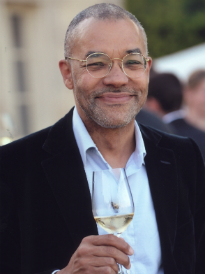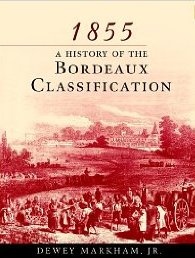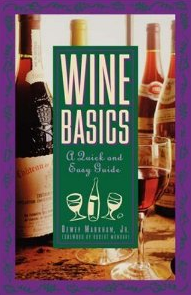French Impressions: Dewey Markham Jr., from French cuisine to Bordeaux wine
10 Tuesday Jan 2012
A Woman’s Paris™ in Food, Interviews
Tags
1855: A History of Bordeaux Classification, Culinary Institute of America, James Beard Award, L'Ecole de Cuisine La Varenne, Marcel Proust, New York University, School of Oenology at Bordeaux University, The New Professional Chef, Wine Basics
Share it
 Dewey Markham Jr., wine scholar and author living in Mérignac, France, was born and raised in New York City. He is a graduate of New York University, with a Bachelor’s degree in English and a Master’s degree in Cinema. During his late twenties, Markham’s professional direction turned to cuisine, and after working as a cook in Manhattan he enrolled in the Culinary Institute of America, the United States’ preeminent cooking school. While still a student at the Institute, Markham began writing articles on various aspects of gastronomy, and after graduation he was awarded a fellowship as an editorial assistant engaged in research and writing for the school’s textbook, The New Professional Chef.
Dewey Markham Jr., wine scholar and author living in Mérignac, France, was born and raised in New York City. He is a graduate of New York University, with a Bachelor’s degree in English and a Master’s degree in Cinema. During his late twenties, Markham’s professional direction turned to cuisine, and after working as a cook in Manhattan he enrolled in the Culinary Institute of America, the United States’ preeminent cooking school. While still a student at the Institute, Markham began writing articles on various aspects of gastronomy, and after graduation he was awarded a fellowship as an editorial assistant engaged in research and writing for the school’s textbook, The New Professional Chef.
Since 1993 Markham has lived and worked in Bordeaux, where he wrote 1855: A History of the Bordeaux Classification, published in 1997 to critical and professional acclaim, and winner of the James Beard award for wine book of the year.
 From 1986 to 1989 Markham lived in Paris, where he was a director of the French cooking school L’Ecole de Cuisine La Varenne, introducing a wine studies program to the curriculum. This led to an increasing shift from cuisine to wine, and upon his return to the United States he worked in two of New York’s leading wine shops, first at Morrell and Company, then at Sherry-Lehmann Wines and Spirits; in addition, Markham has worked as Associate Director of the Swiss Wine Information Council.
From 1986 to 1989 Markham lived in Paris, where he was a director of the French cooking school L’Ecole de Cuisine La Varenne, introducing a wine studies program to the curriculum. This led to an increasing shift from cuisine to wine, and upon his return to the United States he worked in two of New York’s leading wine shops, first at Morrell and Company, then at Sherry-Lehmann Wines and Spirits; in addition, Markham has worked as Associate Director of the Swiss Wine Information Council.
 During this time, he was invited back to the Culinary Institute to teach a series of wine courses, and wrote Wine Basics (published in the United States by John Wiley and Sons), an introductory book for the beginning wine drinker that has become a standard title in the literature, having gone through nineteen printings to date.
During this time, he was invited back to the Culinary Institute to teach a series of wine courses, and wrote Wine Basics (published in the United States by John Wiley and Sons), an introductory book for the beginning wine drinker that has become a standard title in the literature, having gone through nineteen printings to date.
He holds a degree in wine tasting from the School of Oenology at Bordeaux University. Visit: (Website)
INTERVIEW
AWP: Name the books and movies, works of art and music, fashion or cuisine that have inspired you.
DMJ: Since I got into wine through cooking, it’s a book on cuisine, which really got me fired up on gastronomy: Great Chefs of France, by Anthony Blake and Quentin Crewe.
AWP: Do you have any role models?
DMJ: None, really. I tried using role models when I was involved in film and I found that it only led to limitations and frustration. When it came to what I do now it was just a matter of taking whatever opportunities seemed most interesting and which would enable me to achieve my eventual goal of living and working in France.
AWP: What is the last book you read?
DMJ: À l’ombre des jeunes filles en fleurs; I’m currently reading the first part of Le Côté de Guermantes. You’ve caught me in the middle of my “Proust project”: I have long said that I’d know I had a good grasp on French when I could read À la recherché du temps perdu in the original. (I read the English translation back in 1977 and figured that the time had come when I could probably handle it in French.) The other standard I’ve set for achieving a good level of French is to understand the songs of Boby Lapointe.
AWP: What is the best (or worst) advice you’ve ever given or received?
DMJ: Not so much advice, but an injunction from my father: “Don’t ever let me hear the policeman call your name.”
AWP: What handed-down wisdom did you receive from your mother or father?
DMJ: Never be ashamed of talking to yourself; you converse with a better class of person that way.
AWP: In your youth, what did you imagine your adult life would hold?
DMJ: I wanted to be the first man on the moon. (It was a time when we were in the space race with the Russians.)
AWP: What were your favorite childhood things to do?
DMJ: Reading.
AWP: How did you get your foot in the door at the beginning of your career?
DMJ: It started with knocking on doors all over Manhattan to get a job as a dishwasher. I had no experience in a professional kitchen, so the idea was that I could work my way up to applying heat to food and put in the requisite time to apply to the Culinary Institute of America.
PERSONAL STYLE
AWP: Was being stylish important to you growing up in your teens? Is it now?
DMJ: Yes, and it still is although no longer being a footloose young man without a wife or children has put a crimp in actively pursuing this.
AWP: How do you define style or fashion?
DMJ: Something transitory, which comes and goes; what you want to strive for is style. It’s like the difference between weather and climate.
CUISINE
AWP: Tell me about your cooking and eating habits and traditions.
DMJ: Given my geographical situation, it’s French.
AWP: What was your most memorable meal to date?
DMJ: Honestly, I forget. (Not that there have been so many of them…)
AWP: What is in your refrigerator right now?
DMJ: Although not strictly the answer to your question, there is always a bottle of Champagne and in my cellar there are always Mason jars of duck confit. (Each February I prepare 100 legs and thighs to eat throughout the coming year.)
ART OF LIVING
AWP: What do you live for? What do you love above all?
DMJ: To maintain what has turned out to be a pretty good life. My children.
AWP: What natural gift would you most like to possess? What talent are you most thankful for?
DMJ: Natural gift? Never really thought about it; now “supernatural gift” is a whole other thing… Talent? Not burning the food so much. (I certainly put enough time and energy into acquiring it…)
AWP: What question are you tired of being asked?
DMJ: Daddy (or Cheri), where is the…? (I once worked with a dishwasher who would say, “Look with your eyes, not with your mouth.”)
You may also enjoy A Woman’s Paris® post, Le Cordon Bleu in Paris: Another “Sabrina” story, by Karen Cope, food industry specialist, who shares her experiences at Le Cordon Bleu, Paris. She writes about her classes: basic pastry: meringues (French, Swiss and Italian); basic cuisine: classic French soups; second basic pastry: puff pastry; and the recipe and methods at Le Cordon Bleu.
Paris, a particular shade of gray, by Mary Evans a former cooking school director and founder of The Write Cook. Mary recalls the cozy refuges in her long ago memories of Paris and shares her recipe for Chicken Bouillabaisse.
French Women Chefs: les mères lyonnaise, by French writer Laurence Haxaire who tells the stories of former house cooks of affluent families in Lyon who set up their own businesses after the French revolution in the 19th century. And later, when their reputation reached beyond the edge of Lyon, the most famous of them even welcomed such well-known people as General de Gaulle as a VIP at their table.
French Cuisine: Cooking schools in Paris founded by women, by Barbara Redmond who writes about extraordinary women who cook: from Anne Willan, Marthe Distel, and Elisabeth Brassart, to “Les trios gourmands,” Julia Child, Simone Beck, and Louisette Bertholle. Including a directory of cooking schools in Paris.
The Veuve Barbe-Nicole Clicquot and other Widowed women entrepreneurs, by Canadian writer Philippa Campsie who tells about the fast track to businessindependence—or indeed, any kind of independence—two hundred years ago or so, for many women, seems to have been widowhood. The story of Barbe-Nicole Clicquot, better known as Veuve (Widow) Clicquot; a story that also happened to Louise Pommery, Lily Bollinger, and Mathilde Laurent-Perrier, and a few others.
Boulangerie Poilâne: A toast to French Breads, by Barbara Redmond who shares her face-to-face encounter with a French baker during her visit to the 18th century ovens of Poilâne in Paris. Could she steal a pinch from the raw, soft-white boule in its proofing basket resting close by? The penetrating aromas of bread; strong, yeasty, and hot… Recipes included for Tartine Chocolat et Poivre (tartine of melted chocolate and black pepper) and La tartine For’bon (tartine of cheeses and ham) from Boulangerie Poilâne.
A Woman’s Paris — Elegance, Culture and Joie de Vivre
We are captivated by women and men, like you, who use their discipline, wit and resourcefulness to make their own way and who excel at what the French call joie de vivre or “the art of living.” We stand in awe of what you fill into your lives. Free spirits who inspire both admiration and confidence.
Fashion is not something that exists in dresses only. Fashion is in the sky, in the street, fashion has to do with ideas, the way we live, what is happening. — Coco Chanel (1883 – 1971)
Text copyright ©2012 Dewey Markham, Jr. All rights reserved.
Illustrations copyright ©Barbara Redmond. All rights reserved.
barbara@awomansparis.com

